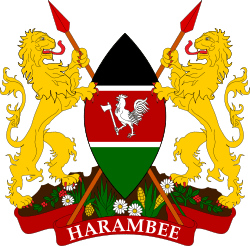Supreme Court of Kenya
 |
| This article is part of a series on the politics and government of Kenya |
|
|
| Foreign relations |
|
Economic schemes |
The Supreme Court of Kenya is the highest court in Kenya. It is established under Article 163 of the Kenyan Constitution. As the highest court in the nation, its decisions are binding and set precedent on all other courts in the country.[1]
Jurisdiction
The Supreme Court has both original and appellate jurisdiction, as well as the jurisdiction to give advisory opinions. The Court has exclusive original jurisdiction to hear and determine disputes relating to the elections to the office of President arising under Article 140 of the Constitution. It has appellate jurisdiction to hear and determine appeals from the Court of Appeal and any other court or tribunal as prescribed by national legislation.
Appeals can only be as a matter of right, where the case involves interpretation or application of the Constitution or a matter certified by the Supreme Court or the Court of Appeal as one that involves a matter of general public importance. The Supreme Court may review a certification by the Court of Appeal and either affirm, vary or overturn it.
The Supreme Court has the right to render advisory opinion at the request of the National Government, any State organ, or any County Government with respect to any matter concerning County Government. It can also determine the validity of a declaration of a state of emergency, an extension of such a declaration, or any legislation enacted in consequence of a declaration of a state of emergency.
Composition
The Supreme Court is made up of seven Judges. These are; the Chief Justice of Kenya, who is the president of the Court, the Deputy Chief Justice of Kenya, who is the deputy to the Chief Justice and vice-president of the court and five other judges. The Supreme Court is properly constituted for purposes of its proceedings when it has a composition of five judges.
In the event that a Chief Justice serves the mandatory ten years as Chief Justice before turning 70, the retired Chief Justice can opt to continue serving as an associate justice, even though this may raise the membership of the court above seven.
Membership
Current Justices
Following a protracted case on the retirement age of Judges who were appointed under the old Constitution of Kenya, the Supreme Court delivered a Ruling which effectively set the retirement age at 70 years, sending the Deputy Chief Justice and one other Supreme Court Judge who had reached 70 on retirement.[2] The following are the current members of the Supreme Court [3]
- Hon. David Maraga - Chief Justice & President of the Court
- Hon. Lady Justice Philomena Mwilu - Deputy Chief Justice & Vice President of the Court
- Hon. Mr. Justice Mohamed Khadhar Ibrahim
- Hon. Justice (Prof.) Jackton Boma Ojwang
- Hon. Justice (Dr.) Smokin Wanjala
- Hon. Lady Justice Njoki Susanna Ndung'u
- Hon. Justice Isaac Lenaola
Former Justices
- Hon. Lady Justice Nancy Makokha Baraza, Retired Deputy Chief Justice & Deputy President Of The Supreme Court Of Kenya
- Hon. Justice (Dr.) Willy Munyoki Mutunga, D. Jur., Sc, EGH, Retired Chief Justice & President Of The Supreme Court Of Kenya
- The Hon. Lady Justice Kalpana Hasmukhrai Rawal, Retired Deputy Chief Justice & Deputy President Of The Supreme Court Of Kenya
- Hon. Mr. Justice Philip Kiptoo Tunoi
2013 Presidency Petition
The first round of the presidential election took place on March 4, 2013. Uhuru Kenyatta was declared the president-elect of Kenya by the Independent Electoral and Boundaries Commission. Raila Odinga challenged this in the Supreme Court. The petition challenging the results of the election due to several technicalities, including discrepancies in voter numbers as reported by the Independent Electoral and Boundaries Commission, and the failure of biometric voter registration kits, was ultimately dismissed on March 30, 2013.
At the end of the petition, the Supreme Court declined to nullify the election and affirmed the victory of Uhuru Kenyatta.
See also
References
- ↑ "Supreme Court Overview". The Judiciary. Republic of Kenya. Archived from the original on 2016-05-01.
- ↑ http://www.standardmedia.co.ke/article/2000205482/supreme-court-dismisses-rawal-tunoi-appeal-on-retirement-age
- ↑ http://www.kenyalaw.org/klr/index.php?id=800
External links
Coordinates: 1°17′15″S 36°49′23″E / 1.2875°S 36.8231°E